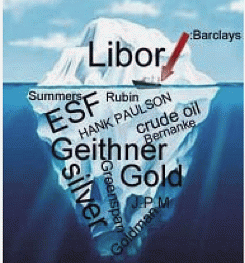It's already clear that the rate rigging, which depends on collusion, goes far beyond Barclays, and indeed the City of London. This is one of multiple scams that have become endemic in a disastrously deregulated system with inbuilt incentives for cartels to manipulate the core price of finance.. . . It could of course have happened only in a private-dominated financial sector, and makes a nonsense of the bankrupt free-market ideology that still holds sway in public life.
. . . A crucial part of the explanation is the unmuzzled political and economic power of the City. . . . Finance has usurped democracy.
Bid-rigging and Rate-rigging
The U. S. Commodities Futures Trading Commission said
in a press release that Barclays Bank "pervasively" reported fictitious rates
rather than actual rates; that it asked other big banks to assist, and helped
them to assist; and that Barclays did so "to benefit the Bank's derivatives
trading positions" and "to protect Barclays' reputation from negative market
and media perceptions concerning Barclays' financial condition."
After resigning, top executives at Barclays promptly implicated both the Bank of England and the Federal Reserve . The upshot is that the biggest banks and their protector central banks engaged in conspiracies to manipulate the most important market interest rates globally, along with the exchange rates propping up the U.S. dollar.
CFTC did not charge Barclays with a crime or require restitution to victims. But Barclays' activities with the other banks appear to be criminal racketeering under federal RICO statutes, which authorize victims to recover treble damages; and class action RICO suits by victims are expected.
The blow to the banking
defendants could be crippling. RICO
laws, which carry treble damages, have taken down
the Gambino crime family, the Genovese crime family, Hell's Angels, and the
Latin Kings.
The Payoff: Not in Interest But
on Interest Rate Swaps
Bank
defenders say no one was hurt. Banks
make their money from interest on loans, and the rigged rates were actually
LOWER than the real rates, REDUCING bank profits.
That may be true for smaller local banks, which do make most of their money from local lending; but these local banks were not among the 16 mega-banks setting LIBOR rates . Only three of the rate-setting banks were U.S.banks--JPMorgan, Citibank and Bank of America--and they slashed their local lending after the 2008 crisis. In the following three years, the four largest U.S. banks--BOA, Citi, JPM and Wells Fargo-- cut back on small business lending by a full 53 percent. The two largest--BOA and Citi--cut back on local lending by 94 percent and 64 percent, respectively.
Their profits now come largely from derivatives. Today, 96% of derivatives are held by just four banks --JPM, Citi, BOA and Goldman Sachs--and the LIBOR scam significantly boosted their profits on these bets. Interest-rate swaps compose fully 82 percent of the derivatives trade. The Bank for International Settlements reports a notional amount outstanding as of June 2009 of $342 trillion. JPM--the king of the derivatives game--revealed in February 2012 that it had cleared $1.4 billion in revenue trading interest-rate swaps in 2011, making them one of the bank's biggest sources of profit.
The losers have been local governments, hospitals, universities and other nonprofits. For more than a decade, banks and insurance companies convinced them that interest-rate swaps would lower interest rates on bonds sold for public projects such as roads, bridges and schools.
The swaps are complicated and come in various forms; but in the most common form, counterparty A (a city, hospital, etc.) pays a fixed interest rate to counterparty B (the bank), while receiving a floating rate indexed to LIBOR or another reference rate. The swaps were entered into to insure against a rise in interest rates; but instead, interest rates fell to historically low levels.
Defenders say "a deal is a deal;" the victims are just
suffering from buyer's remorse. But
while that might be a good defense if interest rates had risen or fallen
naturally in response to demand, this was a deliberate, manipulated move by the
Fed acting to save the banks from their own folly; and the rate-setting banks
colluded in that move. The victims bet
against the house, and the house rigged the game.
Lawsuits Brewing
(Note: You can view every article as one long page if you sign up as an Advocate Member, or higher).






